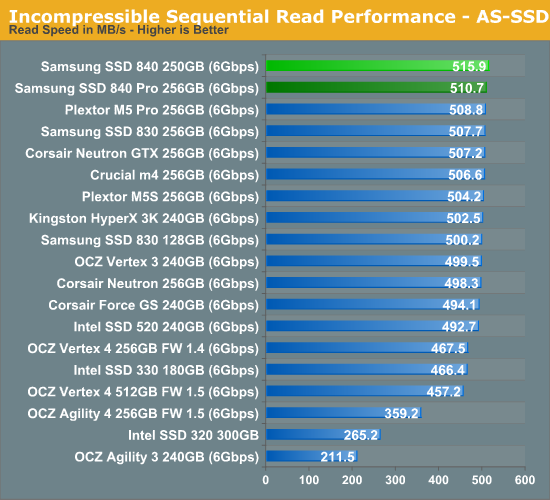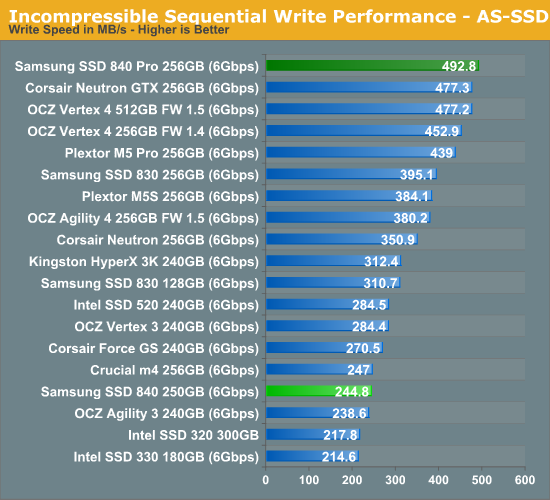Samsung SSD 840 (250GB) Review
by Kristian Vättö on October 8, 2012 12:14 PM EST- Posted in
- Storage
- SSDs
- Samsung
- TLC
- Samsung SSD 840
AS-SSD Incompressible Sequential Performance
The AS-SSD sequential benchmark uses incompressible data for all of its transfers. The result is a pretty big reduction in sequential write speed on SandForce based controllers, while other drives continue to work at roughly the same speed as with compressible data.


Incompressible sequential read/write speeds concur with our IOmeter tests: Read speed is great but write performance is distinctly previous gen.










86 Comments
View All Comments
SSDFDE - Wednesday, November 14, 2012 - link
... actually what happens if I set the IDE (sorry, its ATA actually) password in BIOS and then move the drive to another computer with no ATA HDD BIOS password set? Will it be readable there as the internal key in the drive of course still is the same?As ATA password is an option only, and setting the ATA password does not alter the internal SSD key, the actual encryption on the drive does not change at all no matter if a ATA password is set or not, right?
BTW: Resetting / generating an new internal key seems to be done with "secure erase" on hardware-encrypted drives with internal encryption key... clearly then its only bitshit on the dive once the old key is lost. Is there an option to do that an the Samsung drive anyway?
JellyRoll - Saturday, November 24, 2012 - link
Digital Signal Processing has nothing to do with the voltage states of the NAND. It is processing of the actual signal that comes from the NAND packages.DSP is used for multiple technologies, from audio to video to radar. These devices do not utilize nand, and DSP has zero interaction with the NAND itself, it merely reduces and corrects the amount of errors that come from the NAND.
here is a primer on DSP: http://www.analog.com/en/content/beginners_guide_t...
There needs to be more research before these incorrect explanations are posted.
"Even though DSP doesn't make NAND immortal, it causes a lot less stress on the NAND, allowing it to last for more P/E cycles than what you would get without DSP."--This statement is entirely untrue, as DSP has no interaction with the NAND itself. It seems there is a bit of guesswork going on when writing this article.
DSP simply corrects errors. With lower endurance NAND you experience more errors.
PanzerIV88 - Thursday, December 27, 2012 - link
I just bought on Boxing Day that Samsung 840 250Gb for 150$ + Taxes. The sequential write speed is what scares the most but other than marketing bs it's actualy what's the less important. There's much more happening into the small files or reading speed which it shines in. I'll definitely replace my Vertex 4 128Gb which isn't as amazing as I thought it was, mostly since I learned that once it reaches 50% capacity, it turns into storage mode instead of performance and the write speed falls of 2 to 3x!!! I can confirm this with benchs I've done, it's really sad..Also thought of doing a Vertex 4 Raid 0 but other than bragging with bench numbers, seriously wtf does 600-800Mb/s is gonna do for a daily light load or gaming?! Totaly nothing more... so I'll save my money.
sriggins - Saturday, March 16, 2013 - link
I have been using an 830 in my MacBook Pro since last October. I use FileVault 2 and do a ton of compiling on the drive. Performance has been steady. How does using OS X encryption affect the life of the drive? Is there any way to tell how many writes have been done so far?brainfuck - Wednesday, July 3, 2013 - link
Is there any way to find the Erase Block Size of Samsung 840 250GB?so that i can align my disk accordingly
thanks
WildBillvms - Wednesday, May 21, 2014 - link
Great Drive , but if you have memory problems click here ----> http://www.billatkinson.net/evo